Dogged determination keeps Swiss musher ahead
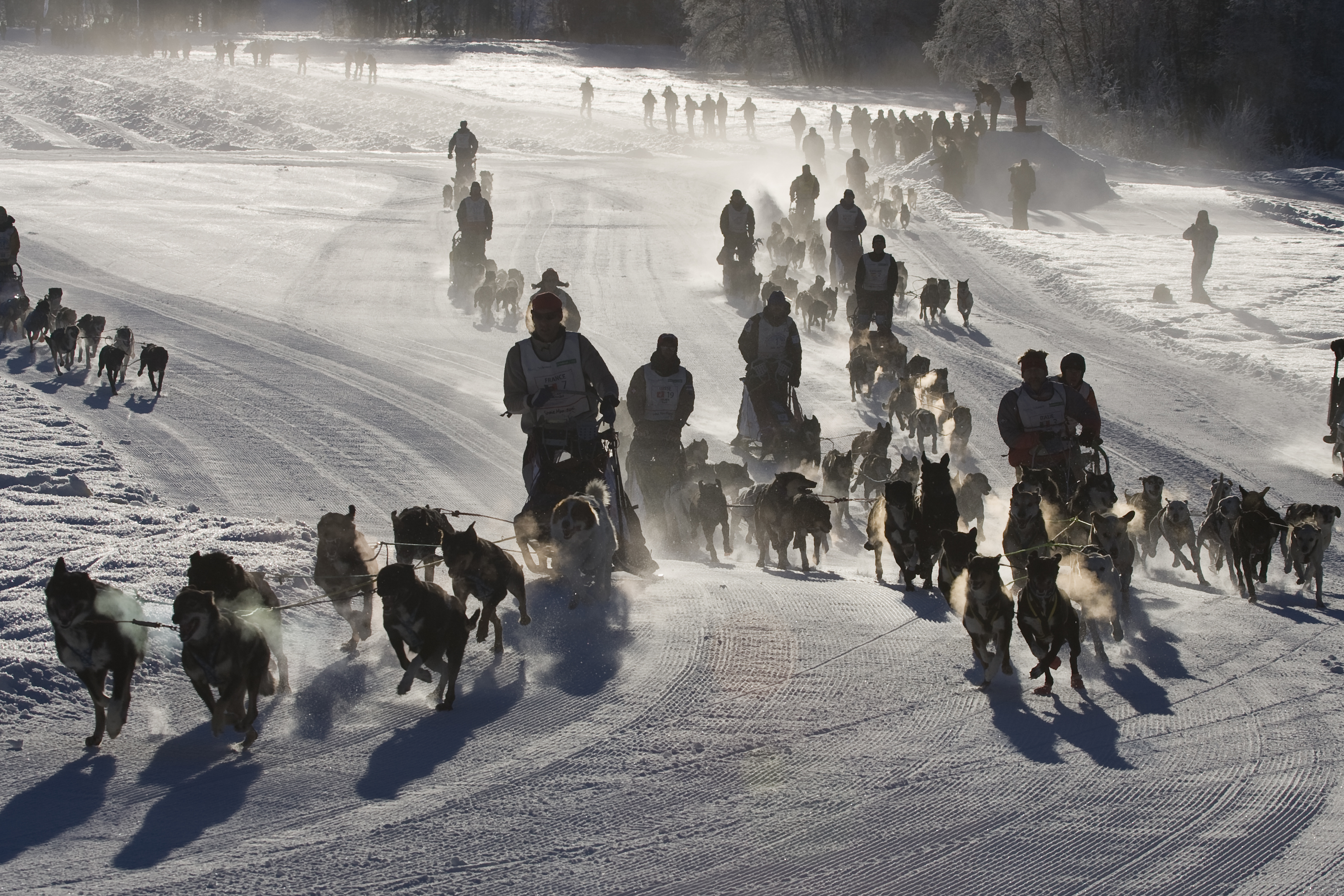
A smiling Emil Inauen gives each of his eight tired huskies a big hug at the end of their gruelling 60-kilometre race through the thick snow and fog.
The Swiss musher from canton Graubünden and his canine team are currently leading the rest of the pack in the sixth Grande Odyssée Savoie-Mont Blanc international dog sled race in the French-Swiss Alps.
Twenty of the best mushers in the world are competing this year in the 1,000-kilometre race through the spectacular mountainous Portes du Soleil and Haute Savoie regions.
“This race is the Tour de France of the dog sled world,” Inauen told swissinfo.ch after winning the fourth stage on Wednesday from Morzine to Champéry in Switzerland.
“All these passes, mountains and stages. As a long-distance stage race, it’s the toughest in the world.”
Over ten days and the same number of stages – seven against the clock, two mass starts and one speed event – the teams pass through 27 villages and resorts in Switzerland and France on stunning mountain trails. They also climb the equivalent of 25,000 metres.
The race stands alongside similar events in North America and Canada, like the Iditarod and Yukon Quest, where weather and racing conditions can be unforgiving.
“But they are flat,” explained organizer Henry Kam, a former telecommunications engineer who launched the event in 2005. “The terrain here is very difficult, so technically without a doubt this is the toughest in the world.”
Husband-and-wife team
The Grande Odyssée is also a rather unusual adventure for the Inauen family. Emil, 37, is competing alongside his wife Barbara, 39, one of three women in this year’s race, who is currently tenth overall.
“But I’m not racing against him, as it’s not possible; he has the better team,” she smiled.
The Swiss-German couple currently live in Norway, where Barbara works as a doctor and Emil develops and sells dog sleds. But their joint passion is dogs and racing. Barbara used to be the handler for his huskies for many years.
“This stage was very snowy and a little stormy,” explained Barbara Inauen, tucking into a plate of stew and rice while warming her feet by a fire at the Champéry arrival zone.
“It’s tough for the riders pushing uphill and especially tough for the dogs downhill,” she said. “It’s hard to break and you go very fast. If you go too fast the dogs can get injured – not seriously, but they get muscle stiffness. They then need one or two days’ rest before being able to run again.”
Happy hounds
Emil is hoping 2010 will be his year. In 2009 he was leading but crashed at the resort of Les Gets and finished second overall, and in 2006, while also in the lead, he ended up in hospital after leaving the trail.
My dog team is working well and looking stronger than in previous years, said the Swiss musher on Wednesday.
“It’s important they are happy and healthy. If there are no accidents I think we should do well.”
Each musher taking part in the Grand Odyssee is allowed a pool of 14 dogs, which are looked after by one or two dog handlers.
Most sled dogs are either Alaskan or Siberian huskies or a crossbreed mixed with English or German pointers, explains Anders Danielsson, the handler for the Swedish musher Petter Karlsson, who is currently third.
“With a mix of pointer and Alaskan husky you get a slightly faster dog that can go long distances,” he explained.
Rotate the squad
A maximum and minimum number of dogs are permitted for each stage. Tired or injured dogs can be dropped off at registered points along the way, if necessary. Seven vets are also on hand to look after the 350 dogs at this year’s event.
“The vets here are very good,” said Danielsson. “When we see something wrong with the dogs, the way they move, for example, we take them to the vets and they can say almost exactly where they are hurt.”
Each dog squad can therefore be rotated on a daily basis. This is just one of the elements that make the race so appealing, said Inauen.
“It’s not just about standing behind a sledge and waiting until the 1,000km is over,” he said. “The musher works very hard with the dogs for success. It’s real teamwork. It’s also tactical, deciding which dog to take on which stage.”
Close bond
A successful musher requires a combination of perfect breeding skills and intensive training, said Inauen, but the most important thing is the relationship with the dogs.
“This starts when they are puppies, working with them every day, walking them, showing them everyday life and not just how to pull a sledge. It creates a real bond; then they are willing to work for you,” said the musher, who talks to his pack in a mixture of Swiss German, English and Norwegian.
“If you gave my dog team to another musher they would surely be much slower.”
But this expensive, “crazy hobby” is not just about racing, he said. “It’s about doing an endurance sport with dogs and working with animals. I really like dogs. They are straight with you and always tell you the truth. They sometimes hold up a mirror to your face and show you what you’re doing wrong,” said Inauen.
Simon Bradley in Champéry, swissinfo.ch
The Sixth Grande Odyssée Savoie-Mont Blanc international dog sled race takes place in the French-Swiss Alps from January 10-20, 2010.
The ten-stage 1,000-kilometre race through the Portes du Soleil and Haute Savoie regions is regarded as one of the toughest and most technical in the world, especially due to the mountainous terrain.
This year 35 teams, with approximately 350 dogs, will be participating, mostly from Europe. Over ten days the teams climb and descend the equivalent of 25,000 metres.
Most of the dogs are Alaskan, Husky and Siberian Husky breeds.
The first race took place in January 2005.
The event, which can be compared with the mythical Iditarod and Yukon Quest races in North America, passes through 27 French-Swiss villages and resorts and attracts around 100,000 spectators.

In compliance with the JTI standards
More: SWI swissinfo.ch certified by the Journalism Trust Initiative

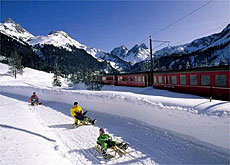
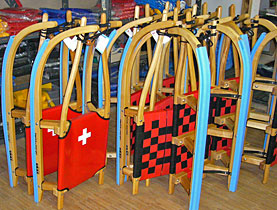
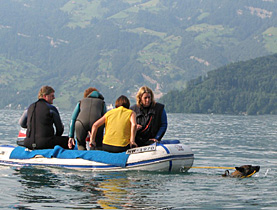
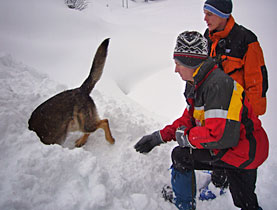
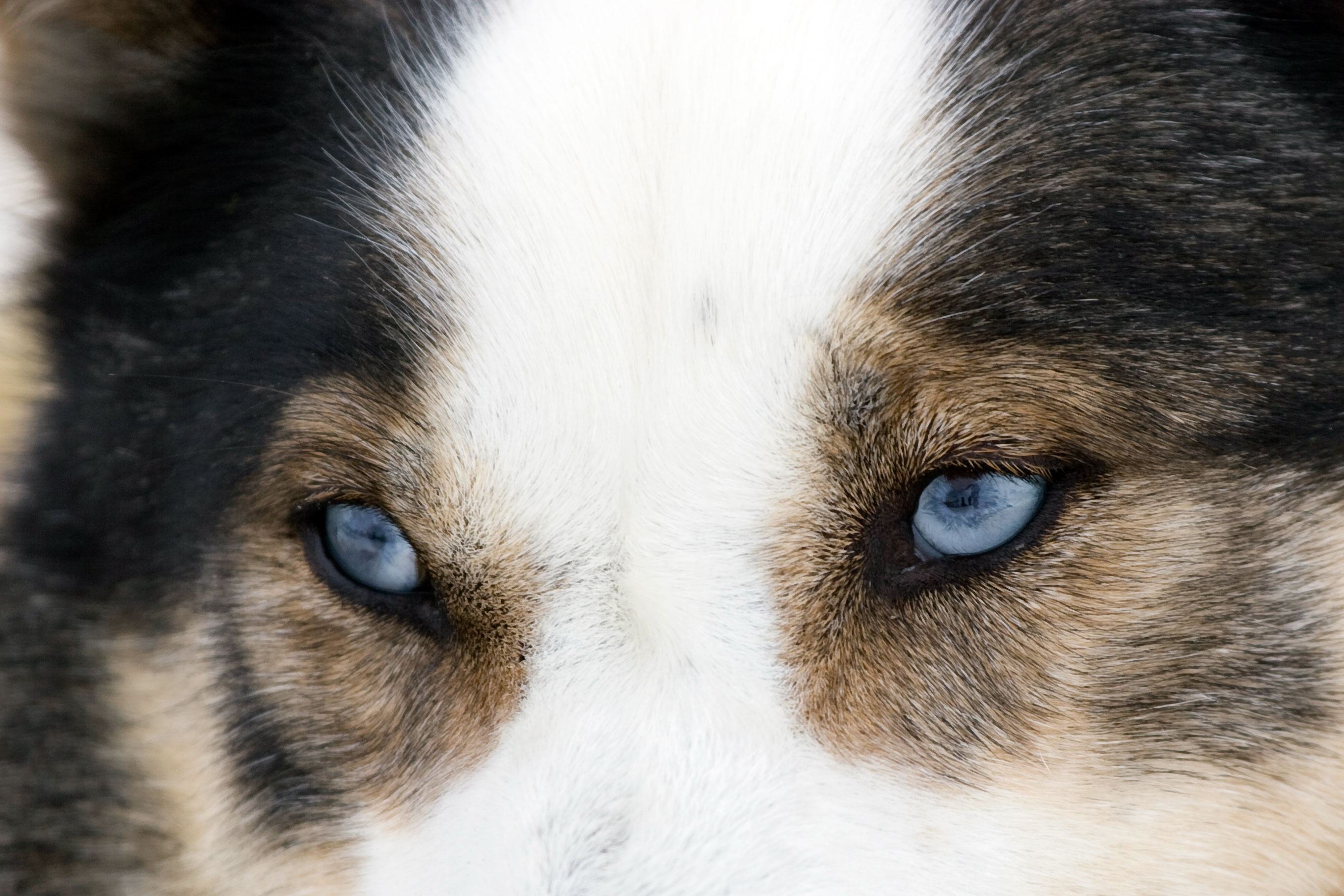
You can find an overview of ongoing debates with our journalists here . Please join us!
If you want to start a conversation about a topic raised in this article or want to report factual errors, email us at english@swissinfo.ch.